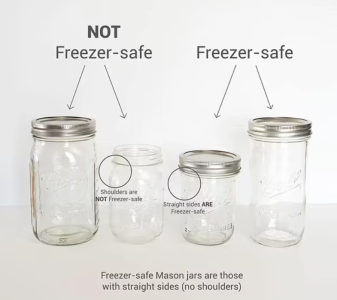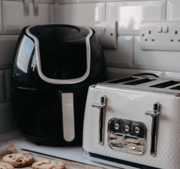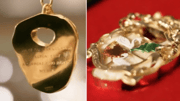Stop freezing glass jars wrong, learn the crucial rules now to avoid disaster!
By
- Replies 8
The art of freezing food in glass jars is a time-honoured tradition, passed down through generations.
It's a fantastic way to preserve the freshness of your home-cooked meals, store leftovers, or prep meals for the week ahead.
However, there's a crucial rule that many home chefs are unaware of, and getting it wrong could lead to a disastrous mess in your freezer.
The secret lies in the type of glass jar you use and how you fill it. Not all glass jars are created equal, and some are not designed to withstand the pressure of freezing.
As food freezes, it expands, and this can cause the glass to crack or even shatter if it's not the right type or if it's overfilled.
A home chef and meal prep aficionado recently shared this vital tip on social media, revealing that the key is to use mason jars with straight sides.
Standard-mouth jars, which have a curved shoulder near the top, may not be able to handle the pressure when food starts to expand during the freezing process.
But even if your jar has straight edges, remember not to fill it to the brim. Overfilling can lead to the jar shattering in the freezer, creating a dangerous mess of glass shards and frozen food.
To help home chefs navigate the tricky process of freezing food in glass jars, Mason Jars shared a freezer-safe checklist:
1.Don't overfill glass jars: Liquids expand when they freeze, and too much pressure can break the glass. Always leave at least an inch of space from the lid for safety.
2. Use jars without shoulders: Tapered jars reduce the pressure when food expands.
3. Keep the lid loose until completely frozen: Don't tighten your lids when you put the jars in the freezer. Wait for the food to be frozen solid before securing them on to alleviate pressure building.
4. Only put room temperature food in the freezer: If you're freezing cooked food, wait for it to cool before putting it in glass jars. To be extra safe, put the jars in the fridge for a few hours before placing them in the freezer.
5. Don't stack the jars: Leave enough space between your jars so they don't jostle each other and break. You can use dividers or fabric to individually wrap them.
6. Don't place frozen jars in the microwave: Let your food thaw in the fridge overnight before heating it. Placing a frozen jar in the microwave could cause it to explode.
Despite these guidelines, some home chefs claim that jars with shoulders can also be freezer-safe, provided you use them correctly.
'It is fine if you leave an inch of headspace,' one woman said. 'I've never had one crack in 30 years.'
'I have used both successfully. I will say the jars with shoulders require you put less in them, allowing it to rise up as it freezes without busting it apart,' another added.
Despite the potential pitfalls, freezing food in glass jars has many benefits.
Glass is a sustainable, reusable material that doesn't leach chemicals into your food like some plastic containers can.
It's also easy to clean and doesn't absorb odours or colours from stored food.
Freezing food can help reduce food waste and save money by allowing you to store leftovers or batch-cooked meals for later use.
It's also a great way to preserve seasonal fruits and vegetables, so you can enjoy them all year round.
So, next time you're planning to freeze your homemade soup, stew, or sauce, remember these tips to ensure you do it safely and effectively. Happy freezing!

What are your experiences with freezing food in glass jars? Do you have any tips or tricks to share? Let us know in the comments below.
It's a fantastic way to preserve the freshness of your home-cooked meals, store leftovers, or prep meals for the week ahead.
However, there's a crucial rule that many home chefs are unaware of, and getting it wrong could lead to a disastrous mess in your freezer.
The secret lies in the type of glass jar you use and how you fill it. Not all glass jars are created equal, and some are not designed to withstand the pressure of freezing.
As food freezes, it expands, and this can cause the glass to crack or even shatter if it's not the right type or if it's overfilled.
A home chef and meal prep aficionado recently shared this vital tip on social media, revealing that the key is to use mason jars with straight sides.
Standard-mouth jars, which have a curved shoulder near the top, may not be able to handle the pressure when food starts to expand during the freezing process.
But even if your jar has straight edges, remember not to fill it to the brim. Overfilling can lead to the jar shattering in the freezer, creating a dangerous mess of glass shards and frozen food.
To help home chefs navigate the tricky process of freezing food in glass jars, Mason Jars shared a freezer-safe checklist:
1.Don't overfill glass jars: Liquids expand when they freeze, and too much pressure can break the glass. Always leave at least an inch of space from the lid for safety.
2. Use jars without shoulders: Tapered jars reduce the pressure when food expands.
3. Keep the lid loose until completely frozen: Don't tighten your lids when you put the jars in the freezer. Wait for the food to be frozen solid before securing them on to alleviate pressure building.
4. Only put room temperature food in the freezer: If you're freezing cooked food, wait for it to cool before putting it in glass jars. To be extra safe, put the jars in the fridge for a few hours before placing them in the freezer.
5. Don't stack the jars: Leave enough space between your jars so they don't jostle each other and break. You can use dividers or fabric to individually wrap them.
6. Don't place frozen jars in the microwave: Let your food thaw in the fridge overnight before heating it. Placing a frozen jar in the microwave could cause it to explode.
Despite these guidelines, some home chefs claim that jars with shoulders can also be freezer-safe, provided you use them correctly.
'It is fine if you leave an inch of headspace,' one woman said. 'I've never had one crack in 30 years.'
'I have used both successfully. I will say the jars with shoulders require you put less in them, allowing it to rise up as it freezes without busting it apart,' another added.
Despite the potential pitfalls, freezing food in glass jars has many benefits.
Glass is a sustainable, reusable material that doesn't leach chemicals into your food like some plastic containers can.
It's also easy to clean and doesn't absorb odours or colours from stored food.
Freezing food can help reduce food waste and save money by allowing you to store leftovers or batch-cooked meals for later use.
It's also a great way to preserve seasonal fruits and vegetables, so you can enjoy them all year round.
So, next time you're planning to freeze your homemade soup, stew, or sauce, remember these tips to ensure you do it safely and effectively. Happy freezing!
Key Takeaways
- A home chef shared an important tip about freezing food in glass jars, noting some jars aren't freezer-safe.
- To prevent glass jars from shattering in the freezer, avoid overfilling and use jars without shoulders.
- A safe freezing checklist includes leaving space at the top, keeping lids loose, cooling food before freezing, not stacking jars, and not microwaving frozen jars.
- There's a debate about whether jars with shoulders can be used at all, but some suggest it's safe if you allow enough headspace for expansion.
What are your experiences with freezing food in glass jars? Do you have any tips or tricks to share? Let us know in the comments below.
Last edited by a moderator:








